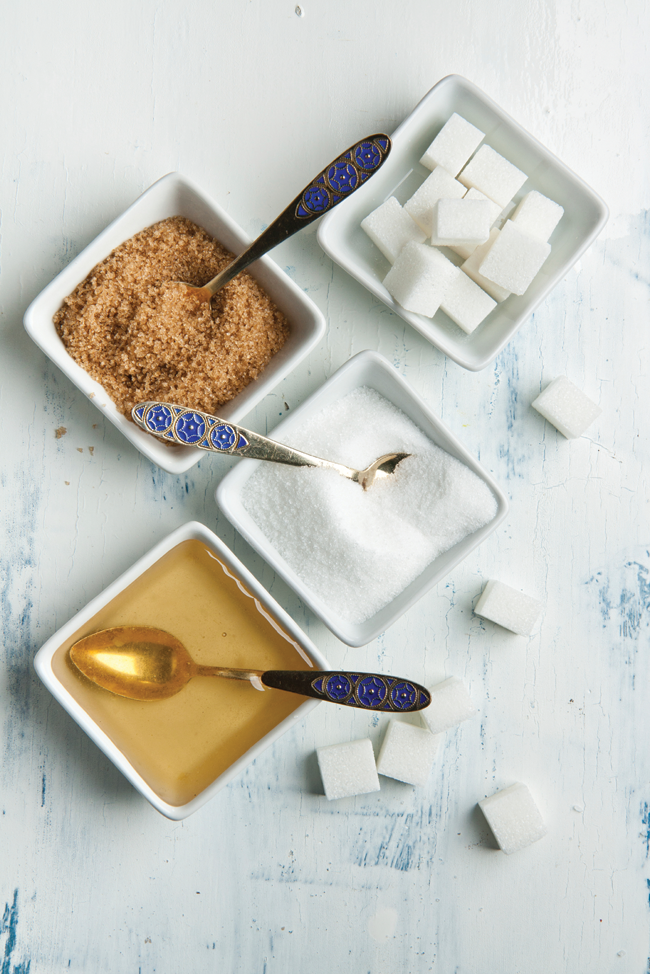Sugar is making all the headlines for the wrong reasons – Annie Jones tells us why…

We all like our sweet things. We all seem to think that it is the best way to give boundless energy on those days when we have so much to do, to see, to achieve! Sugar or caffeine are normally the route some of us take – or even a little glass of wine to get us going! Sound familiar? But do we realise that the sugar we eat is the biggest cause of weight gain? A little is ok, while too much is a challenge to the lovely liver. It’s simple, too much sugar turns to fat – fat glorious fat! Now a little sugar never hurt anyone – however, today, it is simply found in almost everything we eat, from chocolate and biscuits to sauces, cereals and coleslaws. We’re in sugar overload good and proper! Yes I know, it’s not what you want to hear!
What happens?
There are two parts to good old table sugar – glucose and fructose. Now glucose we can deal with fairly well in general, but fructose is the big villain! It seems that the poor old liver has quite a job dealing with it altogether and so converts most of it as fat. The problem with this is that fructose is in almost everything we eat these days = especially in the form of high fructose corn syrup. This form of sugar is designed to keep products – especially fast foods – on the shelf longer.
Some unexpected places you can find sugar:
- All manner of breakfast cereals
- Ketchup and many condiments
- Crackers
- Ice cream
- Salad dressing
- Cooking sauces
- Certain breads
Too much sugar can give rise to diabetes type 2, the new cancer that is creeping up insidiously on people younger and younger in age!
Insulin resistance
When we eat, the food enters the blood stream. At this point the pancreas releases insulin into the blood to help regulate the blood sugar and invite it to go into the cells to make us ready for action. In other words, this process is what gives us a burst of energy. Often, very little physical action takes place – we may be sitting at a desk trying to send an email or lying down in front of the television. The energy is unused, and is then stored as fat in the cells.
The biggest challenge is that we become insulin resistant. There is so much sugar being consumed that the signals to release insulin are not picked up. As a result, high levels of sugar remain in the blood. It is as if the natural process of drawing this glucose out of the blood into the cells has become exhausted.
Leptin resistant – the ‘I am full, back away from the table’ signal
Once we become insulin resistant, we also become leptin resistant. This is the signal that lets us know that we have eaten enough – we are satiated and can back away from the table and stop eating. If this signal is not picked up, we simply find it difficult to stop eating!
Ghrelin resistant – I am hungry, I need food, I am not hungry so I do not need food and it does not stop there – once these two stop working, yet another signal stops working efficiently, and that is the ghrelin signal that normally tells us when we are hungry in the day and at what point we need food or not. Once this switches off we feel hungry almost all the time as there is no control mechanism working to prevent over eating.
Nutrient deficient foods
When our food is not nutrient rich, it also means that we often need more of it to feel satisfied. This will also encourage the body to want more. The natural survival mechanism kicks in. The result is that we become tired, put on enormous amounts of weight, may be dehydrated, experience burning sensation in the limbs, and numbness in the extremities.
10 ways to bring a smile to your face without increasing sugar and fat!
- Take exercise – walking daily switches all our hormones back on
- Eat plenty of good green vegetables as this helps escort fat out of your system
- Eat natural sweeteners in the form of fruit
- Drink plenty of water to keep hydrated
- Make vegetables juices
- Take essential fats to hydrate internally
- Eat three meals a day so that you are not looking for quick fix foods
- Avoid processed foods that are full of sugar
- Reduce alcohol intake as it is high in sugar
To find out more about how to maintain Boundless Energy naturally and to improve diabetes, visit www.druyoga.com
